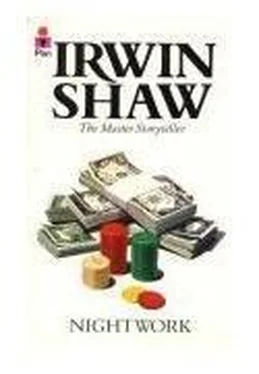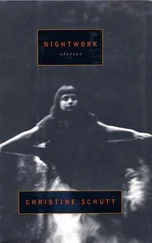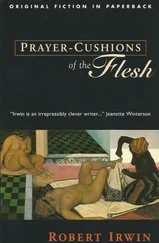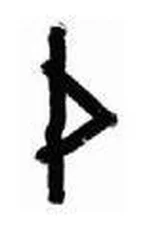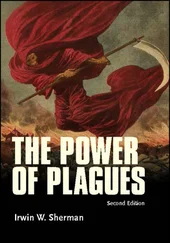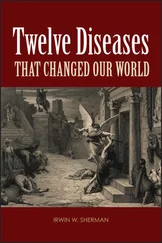Irwin Shaw - Nightwork
Здесь есть возможность читать онлайн «Irwin Shaw - Nightwork» весь текст электронной книги совершенно бесплатно (целиком полную версию без сокращений). В некоторых случаях можно слушать аудио, скачать через торрент в формате fb2 и присутствует краткое содержание. Жанр: Детектив, на английском языке. Описание произведения, (предисловие) а так же отзывы посетителей доступны на портале библиотеки ЛибКат.
- Название:Nightwork
- Автор:
- Жанр:
- Год:неизвестен
- ISBN:нет данных
- Рейтинг книги:3 / 5. Голосов: 1
-
Избранное:Добавить в избранное
- Отзывы:
-
Ваша оценка:
- 60
- 1
- 2
- 3
- 4
- 5
Nightwork: краткое содержание, описание и аннотация
Предлагаем к чтению аннотацию, описание, краткое содержание или предисловие (зависит от того, что написал сам автор книги «Nightwork»). Если вы не нашли необходимую информацию о книге — напишите в комментариях, мы постараемся отыскать её.
Nightwork — читать онлайн бесплатно полную книгу (весь текст) целиком
Ниже представлен текст книги, разбитый по страницам. Система сохранения места последней прочитанной страницы, позволяет с удобством читать онлайн бесплатно книгу «Nightwork», без необходимости каждый раз заново искать на чём Вы остановились. Поставьте закладку, и сможете в любой момент перейти на страницу, на которой закончили чтение.
Интервал:
Закладка:
The sight and sound of her and Lily surrounded by lolling, arrogant young men (at least they seemed so to me) at the table with the magnum of champagne on it had made me flee from the bar. There was no denying that she was a pretty girl, and there would undoubtedly always be young men of that caliber and class in attendance. How would I take that if she were my wife? I had never really thought about what class I belonged to or what class other people might think I belonged to. Miles Fabian could leave Lowell, Massachusetts, behind him and pretend to be an English squire. I doubted that I could ever get rid of Scranton, Pennsylvania, and pretend to be anything but what I was – a grounded pilot, a man trained as a kind of superior technician, dependent on a payroll. What would the guests at the wedding be whispering about me as I stood beside the altar of the English country church waiting for the bride to descend the aisle? Could I invite my brother Hank and his family to the wedding? My brother in San Diego?
Fabian could educate me to a degree, but there were limits, whether he recognized them or not.
As for sex … Still affected by my reveries at the wheel that afternoon I was sure that it would be, at the very least, agreeable. But the passionate desire which I couldn’t help but believe was the only true foundation of any marriage – would I ever be stirred to anything even approximating it by this placid, foreign, hidden girl? And what about the ties of family? Lily, as sister-in-law, with the memory of the night in Florence as a permanent ghost at every reunion? At that very moment I knew I wished the room would empty, leaving Lily and myself alone, untrammeled. Was I doomed always to get close to what I wanted, but never exactly what I wanted?
“This really has turned into a smashing holiday,” Eunice was saying, as she buttered her third roll of the meal. Like her sister, she had a splendid appetite. No matter what else might finally turn out wrong with the children, they would be born with at least half a chance of having marvelous digestions. “When I think of all the poor folk back in bleakest London,” Eunice said, “I could cheer. I have a lovely idea …” She looked around the table with her innocent, blue, childish eyes. “Why don’t we all just stay here in the beautiful sunshine until everything melts?”
“The concierge says it’s going to snow again tomorrow,” I said.
“Just a manner of speaking, Gentle Heart,” Eunice said. She had begun calling me Gentle Heart the second day in Zurich. I hadn’t figured out what it meant yet. “Even when it’s snowing here, you have the feeling the sun is shining, if you know what I mean. In London in winter it’s as though the sun has wandered away permanently.”
I wondered if she would have been so eager to continue the quadruple holiday with old Gentle Heart and his friends if she had been able to overhear the cold-blooded conversation about her future that had taken place in the car on the road to Bern.
“It seems like such a waste to go rushing off to crumbling, noisy Rome when we’re having such a lovely time here,”
Eunice said, the roll now thoroughly buttered. “We’ve all been in Rome, after all.”
“I haven’t,” I said.
“It’ll still be there in the spring,” she said. “Don’t you agree, Lily?”
“It’s a good bet,” Lily said. She was eating spaghetti. She was perhaps the only woman I had ever met who could look graceful eating spaghetti. The sisters had come into my life in the wrong order.
“Miles,” Eunice said, “are you absolutely frantic to get to Rome?”
“Not really,” Fabian said. “There’re a couple of things I want to look into here anyway.”
“Like what?” I asked. “I thought we were here on a holiday.”
“We are,” he said. “But there’re all sorts of holidays, aren’t there? Don’t worry, I won’t interfere with your skiing.”
By the time the meal was over we had decided that we’d stay in Gstaad at least another week. I said I wanted some air and asked Eunice if she would like to take a walk with me, feeling that perhaps if we were alone for once we could make some sort of overt move toward one another, but she yawned and said that the exercise and the cold air all day had left her exhausted and she just had to fling herself into bed. I escorted her out of the dining room to the elevator and kissed her on the cheek and said good night. I didn’t go back to the dining room, but got my coat and took a walk alone, with the snow whirling down around me out of the black night.
The concierge had been wrong. It wasn’t snowing in the morning, but clear, blue, and cold. I rented skis and boots and had some wild runs down the mountain with Lily and Eunice, both of whom skied with a devoted British recklessness that was certain to land them in the hospital eventually. Fabian wasn’t with us. He had some telephone calls to make, he said. He didn’t tell me to whom or on what subject, but I knew I’d find out soon enough and did my best not to speculate just how much more of our joint fortune would be engaged in perilous enterprises before we met for lunch. He had told us he’d meet us around one-thirty at the Eagle Club, on a mountain called the Wassengrat, so that we could eat together. It was an exclusive club, with rules about membership, but Fabian naturally had arranged for us all to be accepted there as guests for our stay in Gstaad.
It was a marvelous morning, the air glittering, the snow perfect, the girls graceful and happy in the sunshine, the speed intoxicating. By itself, I thought at one moment, it made everything that had happened to me since the night in the Hotel St Augustine almost worthwhile. There was only one slightly annoying development. A young American, hung with cameras, kept taking photographs of us again and again, getting onto the lifts, adjusting our skis, laughing together, starting off down the hill.
“Do you know that fellow?” I asked the girls. I didn’t recognize him as one of the men at the table in the bar with them the evening before.
“Never saw him before,” Lily said.
“It’s a tribute to our beauty,” Eunice said. “All three of us.”
“I don’t need any tributes to my beauty,” I said. At one point, when Eunice had fallen and I was climbing back to help her up and put her skis on again, the man appeared and began snapping pictures from all angles. As politely as possible, I said, “Hey, friend, don’t you have enough by now?”
“Never have enough,” the man said. He was a gaunt, easy-speaking young man in baggy old clothes and he continued to click away. “Back at the paper they like to have a wide choice.”
“Paper?” I said. “What paper?”
“Women’s Wear Daily. I’m doing a story on Gstaad. You’re just what I need. Chic and photogenic, with your skis together. Happy people, in the height of fashion, not a care in the world.”
“You think,” I said sourly. “There’re lots of other people around who answer to that description. Why don’t you work on them?” I didn’t relish the idea of having my photograph all over a newspaper in New York with a circulation of maybe a hundred thousand. Who knew what paper the two men who had visited Drusack read every morning?
“If the ladies object,” the man said pleasantly, “of course I’ll stop.”
“We don’t object,” Lily said. “If you’ll send us copies. I adore pictures of myself. If they’re flattering.”
“They could only be flattering,” the young man said gallantly. I suppose he’d taken pictures of a thousand beautiful women in his career and I was sure he hadn’t been shy to begin with. Meanly, I envied him.
But he did ski off, loose and careless over the bumps, and we didn’t see him again until we were on the terrace of the club, having a Bloody Mary, waiting for Fabian to appear.
Читать дальшеИнтервал:
Закладка:
Похожие книги на «Nightwork»
Представляем Вашему вниманию похожие книги на «Nightwork» списком для выбора. Мы отобрали схожую по названию и смыслу литературу в надежде предоставить читателям больше вариантов отыскать новые, интересные, ещё непрочитанные произведения.
Обсуждение, отзывы о книге «Nightwork» и просто собственные мнения читателей. Оставьте ваши комментарии, напишите, что Вы думаете о произведении, его смысле или главных героях. Укажите что конкретно понравилось, а что нет, и почему Вы так считаете.
